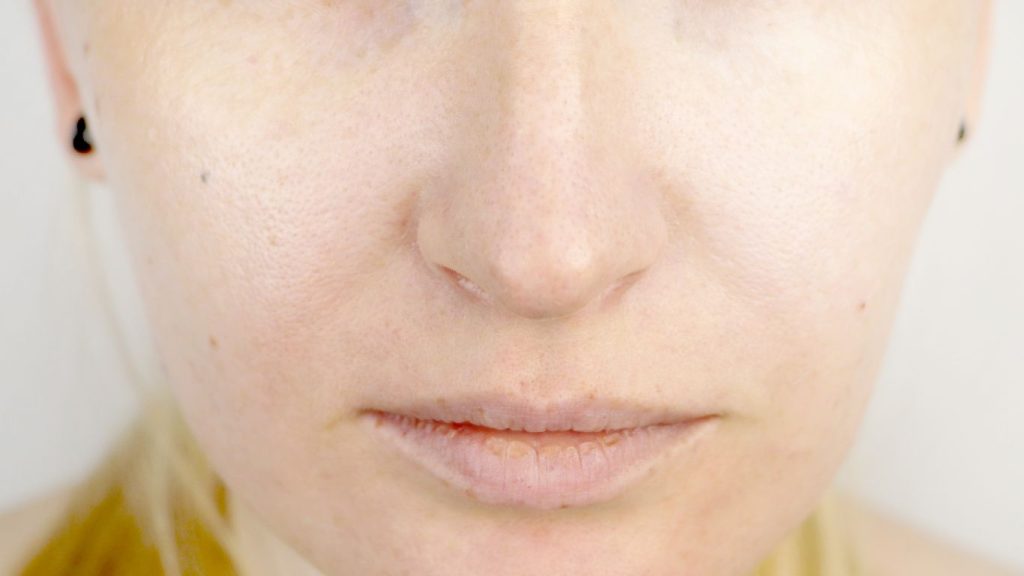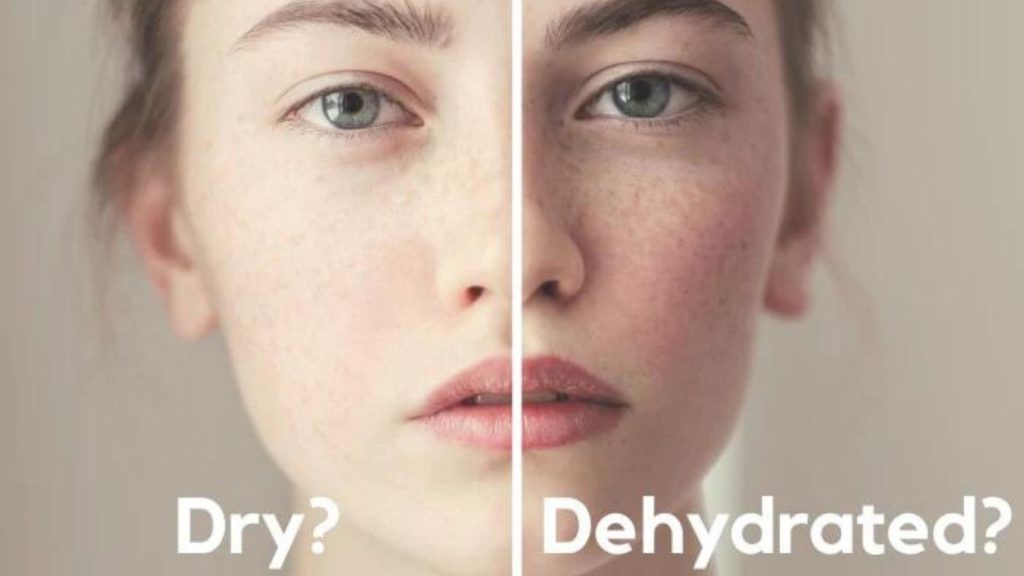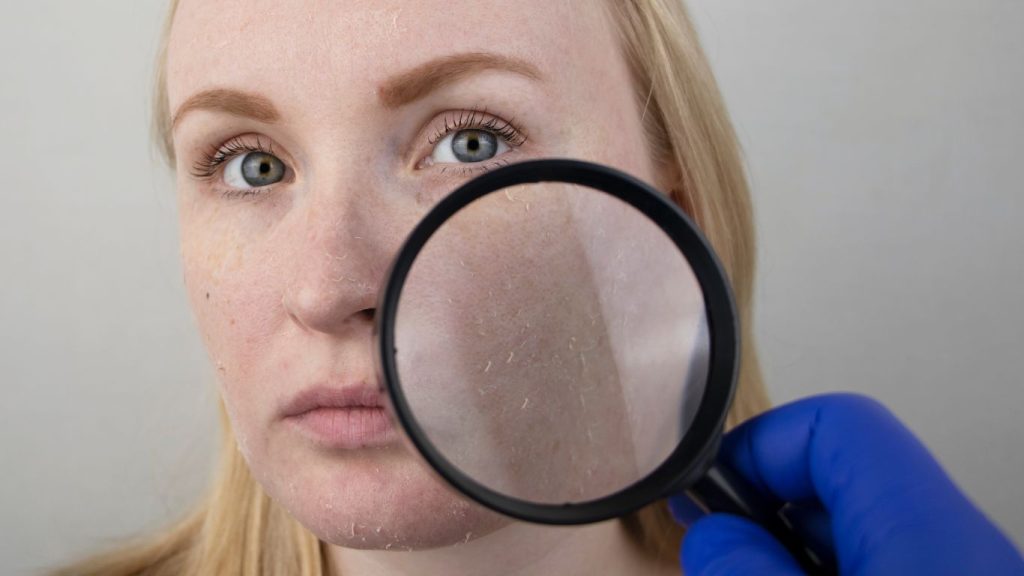Are you experiencing dryness or tightness in your skin? This could indicate dehydration. While using skincare products like creams and serums is important for maintaining skin health and radiance, it’s equally crucial to nourish your skin from within by keeping it hydrated.
The skin’s moisture barrier, which is composed of cholesterol, fatty acids, and ceramides, plays a vital role in retaining moisture and promoting skin health. If this barrier is compromised, your skin becomes more susceptible to cracking and breaking.
When our skin develops cracks, the delicate layers underneath become exposed to dry air which can lead to dehydration. However, the good news is that damage to the skin’s moisture barrier is reversible with the appropriate lifestyle adjustments that can restore hydration levels to your skin.
In this article, we will guide you on how to properly hydrate your skin and highlight the benefits of doing so. Keep reading to learn more!
What Is Hydrated Skin?

Water is essential for skin hydration, as it promotes strength and elasticity, ultimately contributing to a healthy look and feel. Fortunately, our skin has an innate protective barrier designed to retain water. The outermost layer of skin, known as the stratum corneum, is composed of corneocytes – dead skin cells arranged like bricks – held together by lipids that act as mortar.
This “brick wall” structure works to trap moisture inside the cells, effectively keeping our skin hydrated. When the cells beneath our skin’s protective barrier lose an excessive amount of water, dehydration can occur. This leads to cellular shrinkage, causing the skin to appear lackluster, dull, and accentuating the appearance of fine lines and wrinkles.
On the other hand, well-hydrated skin appears smooth, radiant and maintains an even tone. To achieve this, it’s crucial to provide your skin with adequate hydration from time to time to quench its thirst.
Why Does Skin Lose Hydration?
Dry skin can result from a depletion of the lipids responsible for sealing in moisture. Atopic dermatitis, commonly known as eczema, is a prevalent condition that can compromise the skin barrier, leading to increased susceptibility to moisture loss. Additionally, certain habits or lack thereof can contribute to decreased water content in the skin, such as:
- Exposing oneself to extreme cold or heat
- Utilizing harsh chemicals, soaps, and detergents
- Using abrasive sponges, washcloths, or exfoliating products
- Taking prolonged, hot showers or baths
- Using aggressive cleansing techniques
- Exposure to air conditioning
- Inadequate water consumption
Dehydrated Skin Vs Dry Skin

Many people tend to conflate dry skin with dehydrated skin, but there exists a fundamental difference between the two. Dry skin is caused by a reduction in oil-producing glands on the face and body, while dehydrated skin occurs when there is a deficiency of water, not oil.
Several factors, such as climate, lifestyle, age, and skincare product usage, can all contribute to changes in skin type.
1. Symptoms Of Dry Skin
- Itchiness
- Redness
- Flaky skin
- Skin irritation
2. Symptoms Of Dehydrated Skin
- Dull looking skin
- Prominent dark circles
- Itchiness
- Appearance of fine lines / wrinkles
- Puffy eyes
What are the best ways to hydrate your skin?
For instance, you could increase your daily water intake, shorten and use lukewarm water for your showers, or limit your use of soap to preserve your skin’s natural oils.
By implementing these simple tips, you can ensure that your skin remains well-hydrated and healthy.
These issues are relatively simple to address. For instance, you can increase your daily water intake, shorten your showers and use lukewarm water, or reduce the usage of soap that can strip your skin’s natural oils.
These helpful pointers are the crux of maintaining optimal skin hydration.
To take good care of your skin and overall health, try following these tips:
- Aim to get 8 to 9 hours of sleep each night.
- Keep your showers short (between 5 to 10 minutes) and use lukewarm water instead of hot.
- Stay hydrated by drinking enough water throughout the day.
- Limit your consumption of coffee and alcohol, and avoid smoking.
- Use a gentle cleanser to avoid stripping your skin of its natural oils.
- Eat a balanced and diverse diet that includes essential fatty acids.
- Look for skincare products that contain ingredients like ceramides, hyaluronic acid, lipids, and fatty acids, which can help nourish and protect your skin.
- Apply a hydrating sleep mask before bed to give your skin an extra boost of moisture.
- Shield your skin from the sun, wind, and cold by wearing protective clothing and using sunscreen.
- Consider using petroleum jelly to create a barrier that helps lock in moisture.
- Take steps to manage your stress levels, as stress can take a toll on your skin and overall health.
13 steps To Hydrate Your Skin:
1. Drink Sufficient Amount Of Water
To improve your skin’s moisture barrier, it’s important to focus not only on skincare products, but also on what you consume. Adequate hydration is key to replenishing your skin’s moisture levels and keeping your body functioning properly.
In order to achieve this, it’s important to drink plenty of water. Your skin is made up of 30% water, and drinking enough water can help counteract water loss and increase hydration levels in the skin. When we provide our bodies with sufficient moisture from the inside, our protective barrier functions more effectively.
To start hydrating your skin, start by hydrating your body. It’s recommended that you drink at least eight glasses of water each day, though your body may require more depending on factors such as your daily activities and weight. By prioritizing hydration, you can help repair your skin’s moisture barrier and promote overall health and wellness.
2. Use Hydrating Skincare Products
If you’re dealing with dehydrated skin, it’s important to prioritize products that can effectively deliver hydration to your skin. Water-based creams are a great option for this purpose, as they can penetrate through the skin and provide essential moisture.
In addition to choosing water-based creams, it’s also recommended to look for products that contain hydrating agents such as glycerin, hyaluronic acid, urea, and ammonium lactate. These ingredients work to preserve and enhance skin hydration, helping to alleviate the symptoms of dryness and dehydration.
By selecting products that effectively penetrate the skin and contain hydrating agents, you can help to address issues of dehydrated skin and restore a healthy, hydrated complexion.
3. Avoid Very Hot And Long Showers
Spending prolonged hours in the bath can actually break down your skin’s natural barrier. This can cause the loss of essential oils and moisture, leading to skin dehydration. Opting for lukewarm water during bathing is highly recommended.
4. Use Face Masks
Hydrating face masks are rich in moisturizing components. Adding a hydrating face mask to your daily skincare routine can help maintain your skin’s suppleness and moisture. Furthermore, it may lessen the visibility of fine lines and dark circles. It is crucial to choose a face mask that is tailored to moisturizing your skin.
Applying the face mask after showering, rather than before, is recommended. This is because the steam from the shower will open up your pores, allowing the face mask’s ingredients to penetrate your skin more effectively.
5. Use A Humidifier
Including a humidifier in your household can yield several advantages for your skin, especially during the winter season when the air tends to be arid. By releasing additional moisture into the atmosphere, a humidifier can thwart the air from depleting your skin’s natural moisture levels, making it an advantageous measure, especially for those with extremely dry skin.
6. A Sunscreen Is A Must
Whenever you venture outdoors, remember to apply a broad-spectrum sunscreen to safeguard your skin against UVA and UVB damage. Sun exposure can deplete your skin’s moisture content, resulting in the breakdown of collagen and elastin, which are essential for its firmness and suppleness. This can lead to premature signs of aging.
Apart from shielding your skin from the sun’s harmful rays, applying broad-spectrum sunscreen regularly helps to lock in moisture by creating a protective layer. When purchasing sunscreen or beauty products containing SPF, search for ingredients such as zinc oxide and titanium dioxide, which form a physical barrier on the skin’s surface. Using sunscreen to safeguard your skin can have a significant impact on keeping it moisturized.
7. Eat Foods Rich In Water and antioxidant
In addition to being hydrating, fruits and vegetables offer numerous skin benefits. For example, citrus fruits such as oranges and lemons are chock-full of juice and are high in Vitamin C, which is crucial for preserving skin texture. Consuming foods that are rich in Vitamins A and B3 can also promote overall skin health.
8. Reduce Intake Of Caffeine
Caffeine and alcohol can both diminish the moisture levels of your skin, resulting in tightness and dehydration. To mitigate their effects, it is advisable to restrict your consumption to two cups of coffee and one glass of wine.
9. Avoid over-cleansing
Over-cleansing your skin can strip away its natural microbiome and moisturizing agents. If you find yourself needing to cleanse your skin more than twice a day, it’s crucial to apply a light moisturizer afterwards to replenish any lost hydration.
10. Avoid over Exfoliation
Regular exfoliation can be highly advantageous for your skin. If you don’t exfoliate often enough, your skin can accumulate dead skin cells, which can impede the effectiveness of skincare products. It is recommended to exfoliate once or twice per week to eliminate dead skin cells without irritating the skin. Exfoliating more frequently than twice a week, however, can damage the skin barrier, leading to increased dryness and irritation.
11. Eat more healthy fats
Vegetable or plant-based oils contain essential fatty acids and vitamin E that can be absorbed by the skin, benefiting all of your cell membranes. Healthy fats are crucial building blocks for skin cells and are necessary for the proper functioning of the skin as an organ, providing a suitable barrier from the external environment. Zinc may also promote collagen production in the skin and accelerate the repair process.
Foods that are rich in zinc include:
- oysters
- Beef
- Chicken
- Beans
- Nuts
- whole grains
- dairy products.
Some good sources of omega-3 fatty acids are:
- fatty fish such as Salmon, mackerel, and sardines
- Flaxseeds
- chia seeds
- walnuts
12. Moisturize
In the summer months, your body tends to lose a significant amount of moisture, making it crucial to hydrate from the inside out. Along with consuming water-rich foods and drinking enough water, it’s important to adhere to a consistent nighttime skincare routine, including cleansing, toning, and moisturizing. Honey and milk are excellent natural moisturizers that can be incorporated into your skincare regimen.
13. Switch your pillowcase
To safeguard your skin, you may want to switch from cotton pillowcases to fabrics that are gentler and less absorbent. Consider using silk, bamboo, or satin pillowcases instead. Silk fabric may absorb less moisture from your skin compared to cotton.
Hydration vs Moisturization
Hydrating your skin involves adding water to it, whereas moisturizing your skin involves incorporating ingredients that retain the water. Hydration and moisturization complement each other.
Merely adding water to your skin may provide temporary plumpness. However, the water will evaporate unless there are ingredients in place to trap it.
Moisturization entails using ingredients that preserve moisture and revitalize your skin’s barrier. This helps prevent water loss and enhances your skin’s health and texture.
Check your cleanser’s labeling and ditch it, if you need to
Daily facial cleansing is important, but using the wrong type of cleanser can harm your skin’s protective oils and damage your moisture barrier. To begin repairing your moisture barrier, it’s essential to avoid using aggressive cleansers that can strip away the skin’s natural oils. A personalized herbal elixir and an oil-based cleanser are suggested to suit your specific skin concerns. The following should be avoided:
- Gels or foaming cleansers
- Antibacterial cleansers
- Exfoliating scrubs
- Scented products
Seek out hydrating skincare ingredients.
To effectively hydrate your skin, it is recommended to use skincare products that contain three types of moisturizing ingredients: humectants, emollients, and occlusives. These ingredients work in tandem to moisturize and nourish the skin, with each playing a unique and essential role.
- Hummectants such as hyaluronic acid and glycerin in your skincare routine can help to bind water into the outer layer of your skin. However, it is important to use them in conjunction with other components to effectively retain the water content they provide.
- Emollients such as squalane, ceramides, and fatty acids assist in improving the skin’s barrier function, resulting in enhanced skin texture and appearance.
- Occlusives such as petrolatum, beeswax, and mineral oil, create a barrier on the skin, preventing water loss through evaporation, and helping to keep the skin hydrated.
When Should You Visit A Dermatologist?

Dehydrated skin is a common and treatable condition. Using hydrating serums, creams, and lotions can improve your skin’s texture. However, if you do not see any improvement in your skin’s overall health despite hydrating, and if you experience any of the following symptoms, it’s recommended to see a dermatologist:
- White flakes
- Red patches
- Itchy or irritated skin
- Inflammation
- Dry patches spreading on your body or face
Takeaway
To nourish your skin effectively, it’s essential to prioritize hydration and moisturization. Properly hydrating your skin from both the inside and outside is key to maintaining a healthy, youthful, and wrinkle-free complexion. This involves drinking enough water, following a good skincare routine, consuming foods high in water content, and adopting a healthy lifestyle.
However, it’s important to note that achieving hydrated skin is a gradual process, and there are no overnight fixes. While stronger products may provide temporary relief, they can ultimately harm your moisture barrier rather than heal it.
To consistently achieve hydrated skin, it’s best to adopt one or two new habits at a time, plan your meals around skin-healthy ingredients, and carry a water bottle to remind you to stay hydrated throughout the day.






cheapest buy enclomiphene buy dallas
enclomiphene overnight us delivery
medicament kamagra pharmacie en ligne en france achat
commande kamagra en ligne
buy androxal cheap buy online no prescription
cheapest buy androxal generic india
dutasteride for sale canada
get dutasteride generic usa
cheapest buy flexeril cyclobenzaprine buy in the uk
buy flexeril cyclobenzaprine purchase online uk
cheap non prescription gabapentin
purchase gabapentin uk suppliers
order fildena uk order
online order fildena buy dallas
online order itraconazole australia cheap
buy itraconazole cheap store
donde comprar staxyn en lima
staxyn australia legal buy online
avodart pills canada
online order avodart generic pharmacy online
discount rifaximin buy in australia
discount rifaximin generic free shipping
order xifaxan usa where to buy
online order xifaxan ireland over the counter
kamagra v kanadské farmacii
donde comprar kamagra en galerias capon